Claire Schlesinger
Creating and Repairing Robot Programs in Open-World Domains
Oct 24, 2024Abstract:Using Large Language Models (LLMs) to produce robot programs from natural language has allowed for robot systems that can complete a higher diversity of tasks. However, LLM-generated programs may be faulty, either due to ambiguity in instructions, misinterpretation of the desired task, or missing information about the world state. As these programs run, the state of the world changes and they gather new information. When a failure occurs, it is important that they recover from the current world state and avoid repeating steps that they they previously completed successfully. We propose RoboRepair, a system which traces the execution of a program up until error, and then runs an LLM-produced recovery program that minimizes repeated actions. To evaluate the efficacy of our system, we create a benchmark consisting of eleven tasks with various error conditions that require the generation of a recovery program. We compare the efficiency of the recovery program to a plan built with an oracle that has foreknowledge of future errors.
Deploying and Evaluating LLMs to Program Service Mobile Robots
Nov 18, 2023



Abstract:Recent advancements in large language models (LLMs) have spurred interest in using them for generating robot programs from natural language, with promising initial results. We investigate the use of LLMs to generate programs for service mobile robots leveraging mobility, perception, and human interaction skills, and where accurate sequencing and ordering of actions is crucial for success. We contribute CodeBotler, an open-source robot-agnostic tool to program service mobile robots from natural language, and RoboEval, a benchmark for evaluating LLMs' capabilities of generating programs to complete service robot tasks. CodeBotler performs program generation via few-shot prompting of LLMs with an embedded domain-specific language (eDSL) in Python, and leverages skill abstractions to deploy generated programs on any general-purpose mobile robot. RoboEval evaluates the correctness of generated programs by checking execution traces starting with multiple initial states, and checking whether the traces satisfy temporal logic properties that encode correctness for each task. RoboEval also includes multiple prompts per task to test for the robustness of program generation. We evaluate several popular state-of-the-art LLMs with the RoboEval benchmark, and perform a thorough analysis of the modes of failures, resulting in a taxonomy that highlights common pitfalls of LLMs at generating robot programs. We release our code and benchmark at https://amrl.cs.utexas.edu/codebotler/.
Knowledge Transfer from High-Resource to Low-Resource Programming Languages for Code LLMs
Aug 22, 2023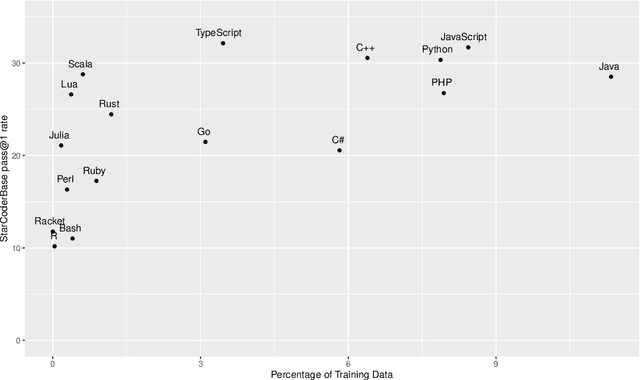
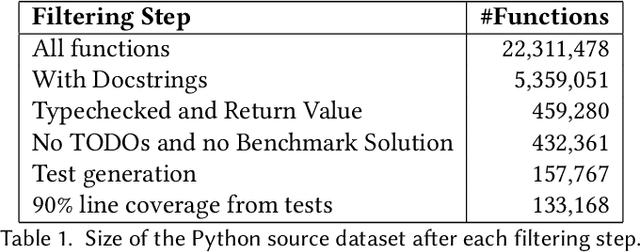
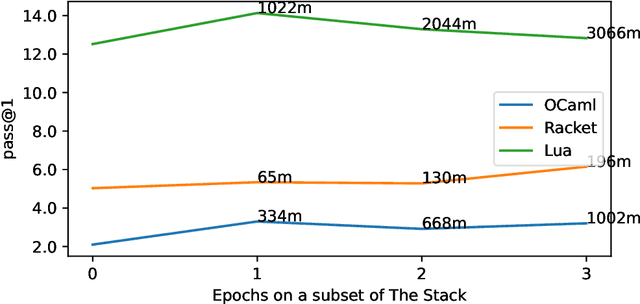
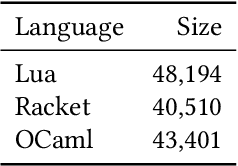
Abstract:Over the past few years, Large Language Models of Code (Code LLMs) have started to have a significant impact on programming practice. Code LLMs are also emerging as a building block for research in programming languages and software engineering. However, the quality of code produced by a Code LLM varies significantly by programming languages. Code LLMs produce impressive results on programming languages that are well represented in their training data (e.g., Java, Python, or JavaScript), but struggle with low-resource languages, like OCaml and Racket. This paper presents an effective approach for boosting the performance of Code LLMs on low-resource languages using semi-synthetic data. Our approach generates high-quality datasets for low-resource languages, which can then be used to fine-tune any pretrained Code LLM. Our approach, called MultiPL-T, translates training data from high-resource languages into training data for low-resource languages. We apply our approach to generate tens of thousands of new, validated training items for Racket, OCaml, and Lua from Python. Moreover, we use an open dataset (The Stack) and model (StarCoderBase), which allow us to decontaminate benchmarks and train models on this data without violating the model license. With MultiPL-T generated data, we present fine-tuned versions of StarCoderBase that achieve state-of-the-art performance for Racket, OCaml, and Lua on benchmark problems. For Lua, our fine-tuned model achieves the same performance as StarCoderBase as Python -- a very high-resource language -- on the MultiPL-E benchmarks. For Racket and OCaml, we double their performance on MultiPL-E, bringing their performance close to higher-resource languages such as Ruby and C#.
StarCoder: may the source be with you!
May 09, 2023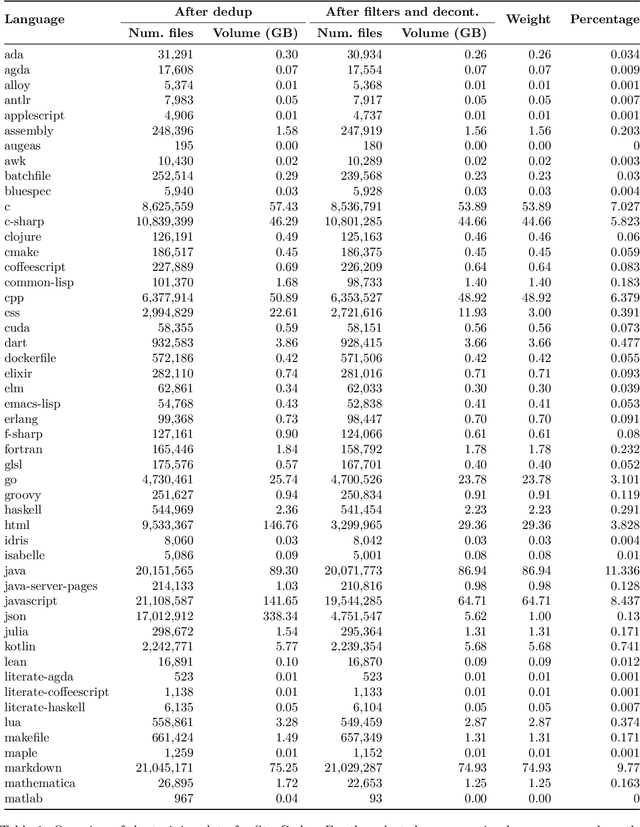
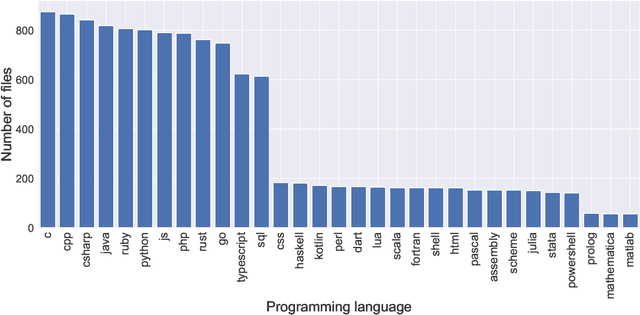
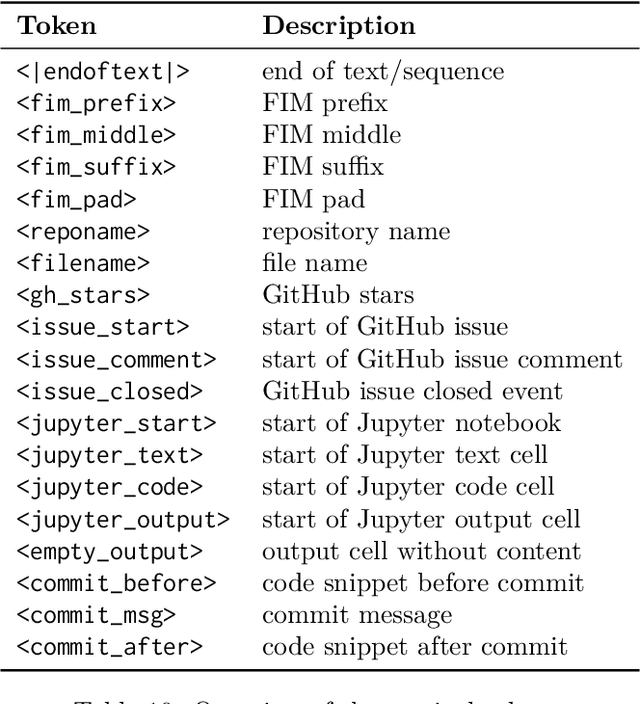
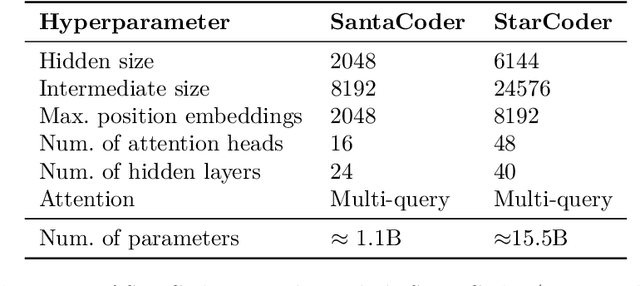
Abstract:The BigCode community, an open-scientific collaboration working on the responsible development of Large Language Models for Code (Code LLMs), introduces StarCoder and StarCoderBase: 15.5B parameter models with 8K context length, infilling capabilities and fast large-batch inference enabled by multi-query attention. StarCoderBase is trained on 1 trillion tokens sourced from The Stack, a large collection of permissively licensed GitHub repositories with inspection tools and an opt-out process. We fine-tuned StarCoderBase on 35B Python tokens, resulting in the creation of StarCoder. We perform the most comprehensive evaluation of Code LLMs to date and show that StarCoderBase outperforms every open Code LLM that supports multiple programming languages and matches or outperforms the OpenAI code-cushman-001 model. Furthermore, StarCoder outperforms every model that is fine-tuned on Python, can be prompted to achieve 40\% pass@1 on HumanEval, and still retains its performance on other programming languages. We take several important steps towards a safe open-access model release, including an improved PII redaction pipeline and a novel attribution tracing tool, and make the StarCoder models publicly available under a more commercially viable version of the Open Responsible AI Model license.
 Add to Chrome
Add to Chrome Add to Firefox
Add to Firefox Add to Edge
Add to Edge